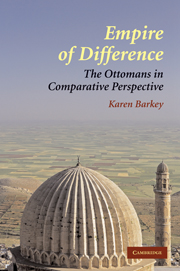Transliterations
Published online by Cambridge University Press: 05 September 2012
Summary
There are various ways of doing the transliteration of foreign words. In this book, I have used Turkish words as much as possible to remain consistent in usage. However, words such as “pasha,” “vizier,” or “devshirme,” which have become quite well known in English, are used in their English spelling. Similarly, although I kept to the Turkish place-names of many regions and towns, I have maintained the English place-names for well-known cities such as Rome, Istanbul, Salonica, Aleppo, and Cairo. I use “Constantinople” to denote the Byzantine city and “Istanbul” the city after 1453.
The following is a key to the pronunciation of Turkish letters:
C: “j” as in Josh
Ç: “ch” as in chess
Ğ: very soft, not really pronounced
I: without a dot, pronounced like the “o” in atom
Ö: pronounced like the French sound “eu”
Ş: pronounced like “sh” in shawl
Ü: pronounced like the French sound “u”
- Type
- Chapter
- Information
- Empire of DifferenceThe Ottomans in Comparative Perspective, pp. xv - xviPublisher: Cambridge University PressPrint publication year: 2008



